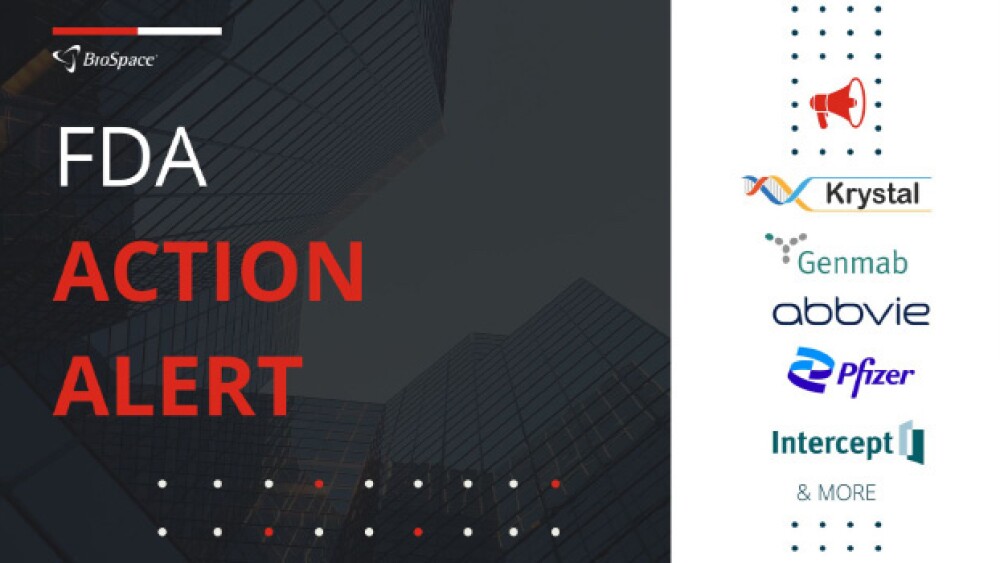The FDA has four events lined up this week, including a target action date for Krystal Biotech’s gene therapy for a rare skin disease and an adcomm meeting for Pfizer’s RSV vaccine candidate.
Pictured: FDA Action Alert graphic/@Nicole Bean
This week, the FDA is set to decide on an investigational gene therapy for a rare skin disease and a bi-specific antibody for cancer. The regulator will also convene advisory committees for two applications.
Read below for more.
Krystal Awaits Verdict for Gene Therapy for Rare Skin Disease
On May 19, the FDA will decide on Krystal Biotech’s investigational gene therapy B-VEC (beremagene geperpavec) for the treatment of dystrophic epidermolysis bullosa (DEB).
DEB is a rare and severe skin condition caused by mutations in the COL7A1 gene, which under healthy conditions, produces the type VII collagen (COL7) protein. In turn, COL7 forms part of anchoring fibers that connect the inner and outer layers of the skin.
This anchoring function of COL7 is faulty in DEB, which manifests as very fragile skin prone to blistering, tearing and wounding from even light friction. These open wounds eventually lead to severe infections and fibrosis. Patients with DEB are also at an elevated risk of an aggressive type of squamous cell carcinoma.
Designed to be administered topically, B-VEC works by delivering two functional copies of the COL7A1 gene to open wounds. It has won the FDA’s Fast Track, Rare Pediatric Disease, Orphan Drug and Regenerative Medicine Advanced Therapy designations.
Krystal submitted its BLA for B-VEC in June 2022, backing it with data from two placebo-controlled trials. In the Phase I/II Gem 1/2 study, treatment with B-VEC enhanced the expression of functional COL7, which in turn led to better wound closure.
Meanwhile, in the Phase III GEM-3 trial, 67% of patients treated with B-VEC achieved complete wound healing after six months as compared with only 22% of placebo counterparts, achieving the study’s main endpoint.
Genmab/AbbVie Seek Approval for Lymphoma Drug
AbbVie and its Danish partner Genmab are seeking the FDA’s nod for their investigational bi-specific antibody epcoritamab for the treatment of patients with relapsed or refractory large B-cell lymphoma (LBCL). The FDA is set to decide on the BLA by May 21.
In their application, which the FDA accepted in November 2022 and tagged for Priority Review, the pharma partners presented safety and preliminary data from the LBCL cohort of their pivotal EPCORE NHL-1 study, a Phase II open-label clinical trial.
Patients treated with epcoritamab saw an overall response rate of 63% and a complete response rate of 39%. The candidate also had a favorable safety profile and did not induce grade 4/5 cytokine release syndrome. Most side effects were mild or moderate.
Epcoritamab works by binding to the CD3 protein found on T cells and to the CD20 protein, which is commonly expressed on B cells and is a well-validated target in B cell malignancies. If approved, epcoritamab could become the first subcutaneous bi-specific antibody for the treatment of LBCL.
AbbVie and Genmab inked their cancer collaboration in June 2020. For an upfront payment of $750 million, AbbVie gained access to Genmab’s next-generation antibody pipeline, which includes epcoritamab. The agreement also entitles Genmab to up to $3.15 billion in potential milestones.
Pfizer’s RSV Vaccine Faces Adcomm Again
On May 18, the FDA’s Vaccines and Related Biological Products Advisory Committee (VRBPAC) will again convene to discuss Pfizer’s respiratory syncytial virus (RSV) vaccine candidate Abrysvo—this time for its proposed use in infants from birth through 6 months of age.
While Pfizer narrowly lost the race to see an RSV vaccine for elderly adults through to the market (GSK secured an FDA approval for its Arexvy on May 3), the New York-based pharma is leading the pack in terms of a pediatric shot. Pfizer is anticipating its approval in the adult setting this month.
In February 2023, the FDA accepted Pfizer’s BLA seeking approval for the maternal injection of its RSV vaccine to induce immunity in infants, with a target action date of August 2023.
The pharma backed its application with top-line data from the Phase III MATISSE study, which found a 66.7% vaccine efficacy against RSV-associated lower respiratory tract illness (LRTI) with two or more symptoms. Against a more severe presentation including at least three symptoms, Pfizer’s investigational shot had an efficacy rate of 85.7%.
In April 2023, Pfizer published more complete data from MATISSE in the New England Journal of Medicine. At 90 and 180 days after birth, the vaccine candidate was 81.8% and 69.4% effective at decreasing medically attended LRTI associated with RSV infections, respectively.
Adcomm Convenes for Intercept’s Liver Fibrosis Treatment
The FDA will convene a panel of external experts on May 19 regarding Intercept Pharmaceuticals’ obeticholic acid (OCA) 25 mg oral tablets, proposed to treat pre-cirrhotic liver fibrosis arising from non-alcoholic steatohepatitis (NASH).
Intercept first submitted an NDA for the 25-mg OCA oral tablets in September 2019, which the FDA rejected in June 2020. The company resubmitted the NDA in December 2022, which the FDA accepted in January 2023. Intercept is seeking accelerated approval.
In March 2023, the FDA announced it would hold an advisory committee meeting to discuss the application.
Intercept supported its NDA with data from the OCA NASH clinical development program, which includes two interim 18-month data readouts from the Phase III REGENERATE study.
Enrolling more than 2,400 patients, REGENERATE is a randomized, double-blinded and placebo-controlled international study evaluating the safety and efficacy of OCA in liver fibrosis due to NASH. Findings from 931 participants at the pre-specified interim analysis showed that the oral medication led to a significant improvement in liver fibrosis by at least one stage without aggravating NASH.
The FDA’s target action date is June 22.
Tristan Manalac is an independent science writer based in metro Manila, Philippines. He can be reached at tristan@tristanmanalac.com or tristan.manalac@biospace.com.






